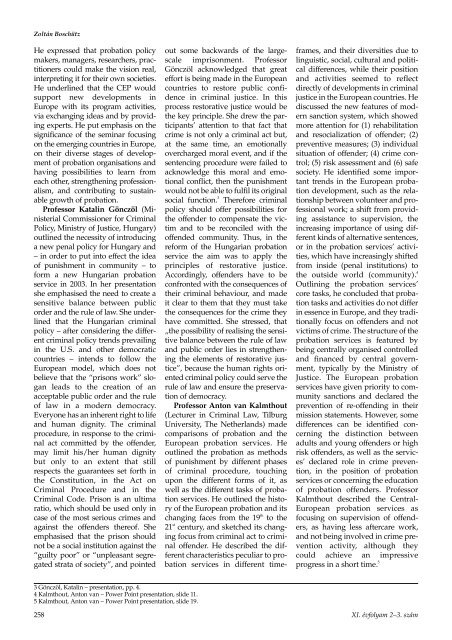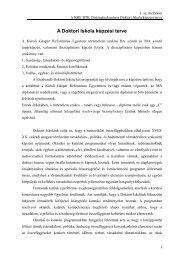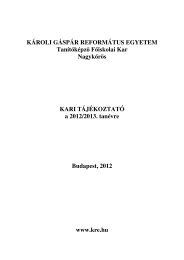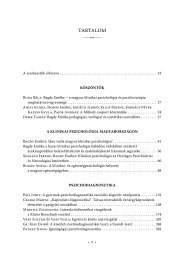collega - Károli Gáspár Református Egyetem
collega - Károli Gáspár Református Egyetem
collega - Károli Gáspár Református Egyetem
You also want an ePaper? Increase the reach of your titles
YUMPU automatically turns print PDFs into web optimized ePapers that Google loves.
Zoltán Boschütz<br />
He expressed that probation policy<br />
makers, managers, researchers, practitioners<br />
could make the vision real,<br />
interpreting it for their own societies.<br />
He underlined that the CEP would<br />
support new developments in<br />
Europe with its program activities,<br />
via exchanging ideas and by providing<br />
experts. He put emphasis on the<br />
significance of the seminar focusing<br />
on the emerging countries in Europe,<br />
on their diverse stages of development<br />
of probation organisations and<br />
having possibilities to learn from<br />
each other, strengthening professionalism,<br />
and contributing to sustainable<br />
growth of probation.<br />
Professor Katalin Gönczöl (Ministerial<br />
Commissioner for Criminal<br />
Policy, Ministry of Justice, Hungary)<br />
outlined the necessity of introducing<br />
a new penal policy for Hungary and<br />
– in order to put into effect the idea<br />
of punishment in community – to<br />
form a new Hungarian probation<br />
service in 2003. In her presentation<br />
she emphasised the need to create a<br />
sensitive balance between public<br />
order and the rule of law. She underlined<br />
that the Hungarian criminal<br />
policy – after considering the different<br />
criminal policy trends prevailing<br />
in the U.S. and other democratic<br />
countries – intends to follow the<br />
European model, which does not<br />
believe that the “prisons work” slogan<br />
leads to the creation of an<br />
acceptable public order and the rule<br />
of law in a modern democracy.<br />
Everyone has an inherent right to life<br />
and human dignity. The criminal<br />
procedure, in response to the criminal<br />
act committed by the offender,<br />
may limit his/her human dignity<br />
but only to an extent that still<br />
respects the guarantees set forth in<br />
the Constitution, in the Act on<br />
Criminal Procedure and in the<br />
Criminal Code. Prison is an ultima<br />
ratio, which should be used only in<br />
case of the most serious crimes and<br />
against the offenders thereof. She<br />
emphasised that the prison should<br />
not be a social institution against the<br />
“guilty poor” or “unpleasant segregated<br />
strata of society”, and pointed<br />
out some backwards of the largescale<br />
imprisonment. Professor<br />
Gönczöl acknowledged that great<br />
effort is being made in the European<br />
countries to restore public confidence<br />
in criminal justice. In this<br />
process restorative justice would be<br />
the key principle. She drew the participants’<br />
attention to that fact that<br />
crime is not only a criminal act but,<br />
at the same time, an emotionally<br />
overcharged moral event, and if the<br />
sentencing procedure were failed to<br />
acknowledge this moral and emotional<br />
conflict, then the punishment<br />
would not be able to fulfil its original<br />
social function. 3<br />
Therefore criminal<br />
policy should offer possibilities for<br />
the offender to compensate the victim<br />
and to be reconciled with the<br />
offended community. Thus, in the<br />
reform of the Hungarian probation<br />
service the aim was to apply the<br />
principles of restorative justice.<br />
Accordingly, offenders have to be<br />
confronted with the consequences of<br />
their criminal behaviour, and made<br />
it clear to them that they must take<br />
the consequences for the crime they<br />
have committed. She stressed, that<br />
„the possibility of realising the sensitive<br />
balance between the rule of law<br />
and public order lies in strengthening<br />
the elements of restorative justice”,<br />
because the human rights oriented<br />
criminal policy could serve the<br />
rule of law and ensure the preservation<br />
of democracy.<br />
Professor Anton van Kalmthout<br />
(Lecturer in Criminal Law, Tilburg<br />
University, The Netherlands) made<br />
comparisons of probation and the<br />
European probation services. He<br />
outlined the probation as methods<br />
of punishment by different phases<br />
of criminal procedure, touching<br />
upon the different forms of it, as<br />
well as the different tasks of probation<br />
services. He outlined the history<br />
of the European probation and its<br />
changing faces from the 19 th<br />
to the<br />
21 st century, and sketched its changing<br />
focus from criminal act to criminal<br />
offender. He described the different<br />
characteristics peculiar to probation<br />
services in different timeframes,<br />
and their diversities due to<br />
linguistic, social, cultural and political<br />
differences, while their position<br />
and activities seemed to reflect<br />
directly of developments in criminal<br />
justice in the European countries. He<br />
discussed the new features of modern<br />
sanction system, which showed<br />
more attention for (1) rehabilitation<br />
and resocialization of offender; (2)<br />
preventive measures; (3) individual<br />
situation of offender; (4) crime control;<br />
(5) risk assessment and (6) safe<br />
society. He identified some important<br />
trends in the European probation<br />
development, such as the relationship<br />
between volunteer and professional<br />
work; a shift from providing<br />
assistance to supervision, the<br />
increasing importance of using different<br />
kinds of alternative sentences,<br />
or in the probation services’ activities,<br />
which have increasingly shifted<br />
from inside (penal institutions) to<br />
the outside world (community). 4<br />
Outlining the probation services’<br />
core tasks, he concluded that probation<br />
tasks and activities do not differ<br />
in essence in Europe, and they traditionally<br />
focus on offenders and not<br />
victims of crime. The structure of the<br />
probation services is featured by<br />
being centrally organised controlled<br />
and financed by central government,<br />
typically by the Ministry of<br />
Justice. The European probation<br />
services have given priority to community<br />
sanctions and declared the<br />
prevention of re-offending in their<br />
mission statements. However, some<br />
differences can be identified concerning<br />
the distinction between<br />
adults and young offenders or high<br />
risk offenders, as well as the services’<br />
declared role in crime prevention,<br />
in the position of probation<br />
services or concerning the education<br />
of probation offenders. Professor<br />
Kalmthout described the Central-<br />
European probation services as<br />
focusing on supervision of offenders,<br />
as having less aftercare work,<br />
and not being involved in crime prevention<br />
activity, although they<br />
could achieve an impressive<br />
progress in a short time. 5<br />
3 Gönczöl, Katalin – presentation, pp. 4.<br />
4 Kalmthout, Anton van – Power Point presentation, slide 11.<br />
5 Kalmthout, Anton van – Power Point presentation, slide 19.<br />
258 XI. évfolyam 2–3. szám

















